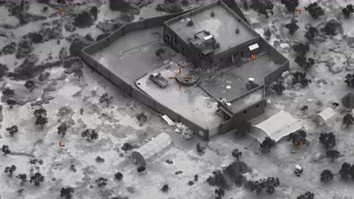KABUL -- Days after "Islamic State of Iraq and Syria" (ISIS) leader Abu Bakr al-Baghdadi emerged from obscurity and admitted his group was in retreat, Afghan and coalition forces killed the leader of the ISIS branch in Afghanistan.
In a 55-minute message broadcast Wednesday (August 22) by ISIS's media operations, al-Baghdadi acknowledged how ISIS is reeling following its military setbacks in the Middle East.
While he called on his followers not to abandon their "religion, patience or jihad", in what appears to be a indication of the group's defeat on the ground, al-Baghdadi declared that "the scale of victory or defeat for the mujahideen is not dependent on a city or town being stolen or subject to those who have aerial superiority".
Al-Baghdadi also touched upon the lack of discipline bubbling up among the group's remnants and warned his deputies to watch for signs of rebellion among their men. He urged ISIS members of different nationalities, regions and ethnicities to refrain from infighting and feuding.
![Members of the Iraqi forces are shown July 2, 2017, at the al-Nuri mosque in Mosul, Iraq, where Abu Bakr al-Baghdadi gave his first sermon as leader of ISIS in 2014. On June 23, 2017, ISIS blew up the mosque while Iraqi forces encircled the area, levelling the building along with its ancient minaret. [Ahmad al-Rubaye/AFP]](/cnmi_pf/images/2018/08/31/14205-000_q56wi-585_329.jpg)
Members of the Iraqi forces are shown July 2, 2017, at the al-Nuri mosque in Mosul, Iraq, where Abu Bakr al-Baghdadi gave his first sermon as leader of ISIS in 2014. On June 23, 2017, ISIS blew up the mosque while Iraqi forces encircled the area, levelling the building along with its ancient minaret. [Ahmad al-Rubaye/AFP]
![Coalition air strikes destroyed ISIS structures July 10 in Nangarhar Province. [NATO courtesy photo]](/cnmi_pf/images/2018/08/31/14203-4564066-585_329.jpg)
Coalition air strikes destroyed ISIS structures July 10 in Nangarhar Province. [NATO courtesy photo]
Al-Baghdadi would not have cited those problems if they were not prevalent, say observers, who note that the spectre of defeat was bound to trigger a wave of disobedience, especially on whether to continue fighting.
Since al-Baghdadi declared the creation of the so-called "caliphate" in 2014, ISIS has lost 95% of its territory in Iraq and Syria and has been reduced to a few small pockets of mostly uninhabited area in Syria.
The new recording comes almost a year after its most recent predecessor.
Reports suggest al-Baghdadi is injured, and authorities say the noose is closing around the jihadist leader after Iraqi forces captured five top ISIS commanders in Syria March 24.
Another Afghan ISIS leader killed
Meanwhile in Afghanistan, ISIS suffered yet another setback in a series of blows.
The leader of ISIS's Khorasan branch (ISIS-K), Abu Saad Arhabi, also identified as Abu Sayed Orakzai, was killed in a joint Afghan-coalition air strike late Saturday (August 25) in Khogyani District, Nangarhar Province, according to the National Directorate of Security (NDS).
"The Emir of Daesh in Afghanistan along with 10 others was killed," said a statement by NDS, calling the group by its Arabic acronym.
Ataullah Khogyani, the spokesman for Nangarhar provincial governor, confirmed Arhabi's death.
"Air strikes were carried out in the area, and coalition forces fired rockets from Jalalabad airport," Khogyani said, adding that "we had intelligence reports about this leader of Daesh in the area, and we shared them with our foreign partners."
It was not clear whether "rockets ... or air strikes" killed Arhabi, continued Khogyani, saying, "More than ten militants, including some commanders, were also killed.
Arhabi is the fourth leader of ISIS-K to be killed since the group first emerged in the country around 2014.
The spokesman for US forces in Afghanistan, Lt. Col. Martin O'Donnell, confirmed they had conducted an air strike in the location described by Afghan officials, which "targeted a senior leader of a designated terrorist organisation".
Hours before the raid, the group claimed responsibility for a deadly suicide attack that appeared to target a sit-in protest outside the provincial election commission office in Jalalabad. The bombing reportedly killed two Afghans and wounded four, according to Afghan officials.
The Jalalabad bombing followed a number of bloody attacks claimed by ISIS in recent weeks, including assaults on several government installations in Kabul and a bombing at a school that killed at least 37 people.
Despite committing numerous terrorist acts, the group is on the run and has suffered repeated setbacks in the past year during a bloody turf war with the Taliban.
Early this month, more than 150 ISIS fighters surrendered en masse to Afghan forces in Jawzjan, a move that Afghan forces hailed as the end of the group's foothold in the north of the country.
This ISIS capitulation comes after weeks of intense fighting with the Taliban in Jawzjan that reportedly killed more than 300 militants from both sides.
Arhabi succeeded Abu Sayed, who perished in a US air strike on July 11 in Kunar Province, only months after his own predecessor, Abdul Hasib, was killed in Nangarhar.
[Khalid Zerai from Nangarhar contributed to this report.]

![ISIS leader Abu Bakr al-Baghdadi announces the creation of his so-called caliphate in this screenshot from a June 2014 video. [File]](/cnmi_pf/images/2018/08/31/14204-mosul-baghdadi-speech__4_-585_329.jpg)







Your article was awesome, it offered a lot to know about ISIS.
Reply1 Comment(s)